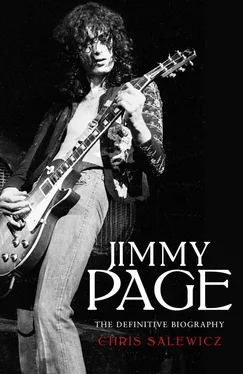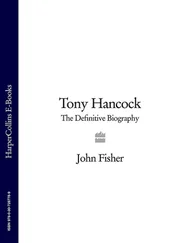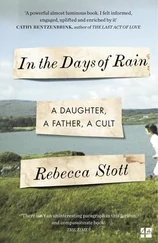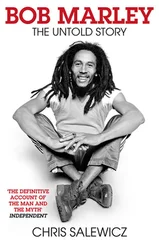‘I always try to do things wholeheartedly or not at all,’ said Beck, offering a slight rewrite of history, ‘so I tried to imagine what my ideal band would be. We had the right producer, Keith Moon on drums, Jimmy on guitar and John Paul Jones on bass. You could feel the excitement in the studio, even though we didn’t know what we were going to play. I thought, “This is it! What a line-up!” But afterwards nothing really happened because Moony couldn’t leave the Who. He arrived at the studio in disguise so no one would know he was playing with another band.’
‘Jim Page and I arranged a session with Keith Moon in secret, just to see what would happen,’ said Beck. ‘But we had to have something to play in the studio because Keith only had a limited time – he could only give us like three hours before his roadies would start looking for him. I went over to Jim’s house a few days before the session and he was strumming away on this 12-string Fender electric that had a really big sound. It was the sound of that Fender 12-string that really inspired the melody. And I don’t care what he says, I invented that melody. He hit these Amaj7 chords and the Em7 chords, and I just started playing over the top of it … He was playing the bolero rhythm and I played the melody on top of it, but then I said: “Jim, you’ve got to break away from the bolero beat – you can’t go on like that for ever!” So we stopped it dead in the middle of the song – like the Yardbirds would do on “For Your Love” – then we stuck that riff into the middle. And I went home and worked out the other bit [the uptempo section].’
‘Even though he said he wrote it, I wrote it,’ said Page, presenting an argument that would become somewhat familiar.
‘Moon did this amazing fill around the kit, and a U47 mic just left its stand and went flying across the room; he just cracked it one,’ said John Paul Jones.
‘I remember Jimmy at the studio yelling at us and calling us fucking hooligans,’ said Beck. ‘Everyone had prior commitments. That session that day, it was one day that really started my head turning – we were almost doing it.’
That band, claimed Beck, was the original Led Zeppelin – ‘not called “Led Zeppelin”, but that was still the earliest embryo of the band’.
‘It was going to be me and Beck on guitars, Moon on drums, maybe Nicky Hopkins on piano. The only one from the session who wasn’t going to be in it was Jonesy, who played bass,’ said Page. ‘It would have been the first of all those bands, sort of like Cream and everything. Instead, it didn’t happen – apart from the “Bolero”. That’s the closest it got … The idea sort of fell apart. We just said, “Let’s forget about the whole thing, quick.” Instead of being more positive about it and looking for another singer, we just let it slip by. Then the Who began a tour, the Yardbirds began a tour, and that was it.’
In fact, there had been some efforts by Page and Beck to find an appropriate vocalist to transmogrify the ‘Beck’s Bolero’ studio line-up into a working outfit, as Page told Guitar World ’s Steve Rosen: ‘Well, it was going to be either Steve Marriott from the Small Faces or Steve Winwood.’ Marriott was managed by Don Arden, the self-styled ‘Al Capone of pop’. ‘In the end, the reply came back from his office: “How would you like to have a group with no fingers, boys?” Or words to that effect.’ Sufficiently warned off, the pair never even approached the Spencer Davis Group’s Steve Winwood.
There was even controversy over the ‘Beck’s Bolero’ production credit. Mickie Most claimed it, part of a contractual issue between him and Beck, his managerial client. Simon Napier-Bell would insist it was his, and Jimmy Page claimed that he had done the record’s production, staying behind in the studio long after Napier-Bell had gone home.
‘The track was done and then the producer just disappeared,’ Page told Steve Rosen in September 1977. ‘He was never seen again: he simply didn’t come back. Napier-Bell, he just sort of left me and Jeff to it. Jeff was playing and I was in the box [studio]. And even though he says he wrote it, I’m playing the electric 12-string on it. Beck’s doing the slide bits, and I’m basically playing around the chords.’
Simon Napier-Bell has a different point of view. ‘Jimmy Page was being demeaning when we were making the record: he was sneering. Later, when Beck and Page were discussing how the mix should be, I went away to leave them to it. The purpose of a producer is so that the record ends up as it should. That’s why I went away – to leave them to it. As for Mickie Most, my agreement with him over the management of the Yardbirds was that all product reverted to him. I just said, “What the hell, I don’t need it.” I didn’t really – but that track became a rock milestone.’
When Pete Townshend discovered that Keith Moon had played on the session, he was furious. He began to refer to Beck and Page as ‘flashy little guitarists of very little brain’. Page’s response? ‘Townshend got into feedback because he couldn’t play single notes.’ Townshend later commented: ‘The thing is, when Keith did “Beck’s Bolero”, that wasn’t just a session, it was a political move. It was at a point when the group was very close to breaking up. Keith was very paranoid and going through a heavy pills thing. He wanted to make the group plead for him because he’d joined Beck.’
Later, it was claimed that Moon had declared that if the studio line-up became an actual band, it would go down ‘like a lead balloon’. According to Peter Grant, Entwistle then added, ‘like a lead zeppelin’. (Entwistle was always adamant that he came up with the Lead Zeppelin name all on his own; and also that he had the idea of a flaming Zeppelin as an album cover.)
When writing his Keith Moon biography Dear Boy , Tony Fletcher interviewed Jeff Beck about the ‘Beck’s Bolero’ session. Fletcher asked Beck if Moon had been using him to pressure the Who for his own ends. Beck replied that that wasn’t the case at all: the subtext to the ‘Beck’s Bolero’ session was the relationship between Jimmy Page and himself: ‘No, it was something to do with Jimmy and me. I had done sessions for Jimmy. He used to get me to do all the shit he didn’t want to do. He used to get me to pick him up in my car and pay for the petrol, and I’d find out he was on the session anyway. When he heard what I was doing on the sessions … he started taking an interest in my style, and then we went from there. And then the Yardbirds got in the way – I can’t remember the sequence of events. I remember thinking, “Why can’t I have what I want instead of what I’ve got?” That’s always the way. To have someone who’s so musically aware and talented as Jim alongside me was something I could really do with. But that wasn’t to be until later on in the Yardbirds. Meanwhile, I’m watching the Who going from strength to strength with a fantastic powerful drummer and knowing that that was what I really needed to get myself going. So it was a guiding light in one sense and fragmented what I already had. I was never content being in the Yardbirds, and I left Jim to paddle his canoe in the Yardbirds.’
The Yardbirds’ rhythm-guitar player Chris Dreja was yet another denizen of the Surrey Deep South from which Page, Clapton and Beck hailed. Brought up in Surbiton, where he continued to live, he would from time to time run into Page while the guitarist was studying at Sutton Art College. On more than one occasion he came across him in nearby Tolworth, outside the tropical-fish shop: Page was a tropical-fish enthusiast. ‘Hello, Chris, I’ve just bought a nice thermometer for my fish,’ he once greeted him.
Читать дальше












